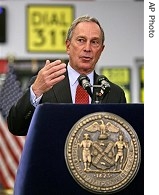2007年VOA标准英语-New York Mayor's Decision to Leave Republican P
时间:2019-01-13 作者:英语课 分类:2007年VOA标准英语(六月)
Washington
21 June 2007
New York City Mayor Michael Bloomberg caused a political stir this week with his decision to leave the Republican Party to become an unaffiliated independent. Bloomberg's move has fueled speculation 1 that he might run as an independent candidate for president next year. VOA National correspondent Jim Malone has more from Washington.

Michael Bloomberg speaks at a press conference in New York, 20 June 2007
Bloomberg is popular in New York but not well known nationally. But there are some political experts who believe his conservative approach to spending public money combined with more liberal social views could appeal to centrist voters in next year's election.
At a recent news conference, Bloomberg insisted that he intends to finish out his second term as mayor that runs until 2009.
But he also seemed to leave open the possibility of involvement in national politics sometime in the near future.
"But I am confident that this country will have options," Bloomberg said. "I do think that the more people that run for office, the better."
Public opinion polls at the moment show a large majority of Americans believe the country is on the wrong track and that many people have tired of the political bickering 2 that has dominated Washington in recent years.
Bloomberg says one of his major concerns is that important issues like pension reform and environmental safeguards have been given little attention because of the political partisanship 3 in Washington.
"I do not think that we are addressing those issues," he said. "I am particularly upset that the big issues of the time keep getting pushed to the back and we focus on small things that only inside the [Washington] beltway are important."
New York-based political consultant 4 Joseph Mercurio says Bloomberg's decision to cast himself as an independent could set the stage for a third party challenge for the White House in 2008.
"I think this is pretty clear that he is certainly keeping his option open to run as a candidate for president," he said. "He did it because there are some states that require you not to be a Democrat 5 or a Republican when you file independent nominating petitions."
If he decided 6 to run as an independent, Bloomberg would most likely try to appeal to a large group of discontented voters in the middle of the political spectrum 7 who find the two major political parties too polarizing.
Bloomberg could also tap into his considerable personal fortune, worth billions of dollars, to finance his bid for the White House.
"This is somebody who has a great deal of his own money and somebody who would run, theoretically, as not a Democrat, not a Republican, somebody who is going to come in and address folks in the middle who feel they are frustrated 8 with what they are getting from either side," said Amy Walter, editor of the Hotline political newsletter and a guest on the C-SPAN public affairs cable television network.
Some Democrats 9 fear an independent presidential bid by Bloomberg would draw votes from the Democratic Party's presidential nominee 10 and could help the Republicans in the general election in November of 2008.
If Bloomberg decided to join the race, he would be the third prominent New Yorker to launch a bid for the White House.
It is a source of pride and amusement for some long time New York political observers like Maurice Carroll, who now directs the polling institute at Quinnipiac University in Connecticut.
"As a former New York reporter who still stays in touch with New York politics, I have to wonder. Suppose the Republicans nominated [former New York City Mayor Rudy] Giuliani and the Democrats nominate Mrs. Clinton, both obviously with a lot of support if they get nominated but also with big negatives," Carroll said. "Could Mayor Michael Bloomberg of New York City run as an independent? It has never worked before, but hey [you never know]."
The recent history of third party presidential candidates suggests Bloomberg would be taking on a long shot challenge if he decided to run.
Independent candidate Ross Perot received 19 percent of the popular vote in the 1992 race won by Bill Clinton over then President George H.W. Bush. But Perot failed to win a single vote in the electoral college that decides presidential elections.
- Her mind is occupied with speculation.她的头脑忙于思考。
- There is widespread speculation that he is going to resign.人们普遍推测他要辞职。
- The children are always bickering about something or other. 孩子们有事没事总是在争吵。
- The two children were always bickering with each other over small matters. 这两个孩子总是为些小事斗嘴。 来自《现代汉英综合大词典》
- Her violent partisanship was fighting Soames's battle. 她的激烈偏袒等于替索米斯卖气力。
- There was a link of understanding between them, more important than affection or partisanship. ' 比起人间的感情,比起相同的政见,这一点都来得格外重要。 来自英汉文学
- He is a consultant on law affairs to the mayor.他是市长的一个法律顾问。
- Originally,Gar had agreed to come up as a consultant.原来,加尔只答应来充当我们的顾问。
- The Democrat and the Public criticized each other.民主党人和共和党人互相攻击。
- About two years later,he was defeated by Democrat Jimmy Carter.大约两年后,他被民主党人杰米卡特击败。
- This gave them a decided advantage over their opponents.这使他们比对手具有明显的优势。
- There is a decided difference between British and Chinese way of greeting.英国人和中国人打招呼的方式有很明显的区别。
- This is a kind of atomic spectrum.这是一种原子光谱。
- We have known much of the constitution of the solar spectrum.关于太阳光谱的构成,我们已了解不少。
- It's very easy to get frustrated in this job. 这个工作很容易令人懊恼。
- The bad weather frustrated all our hopes of going out. 恶劣的天气破坏了我们出行的愿望。 来自《简明英汉词典》
- The Democrats held a pep rally on Capitol Hill yesterday. 民主党昨天在国会山召开了竞选誓师大会。
- The democrats organize a filibuster in the senate. 民主党党员组织了阻挠议事。 来自《简明英汉词典》